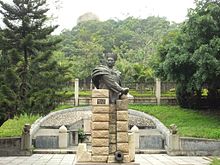Chen Huacheng
Chen Huacheng | |
|---|---|
 Chen Huacheng's tomb. | |
| Native name | 陳化成 |
| Born | 1776 |
| Died | June 16, 1842 (aged 65–66) |
| Battles/wars | First Opium War: |
Chen Huancheng (Chinese: 陳化成; pinyin: Chén Tiānhuá; 1776–1842) was a 19th-century military leader of Qing China.[1] He served as the provincial military leader in Jiangnan Province before being killed in the First Opium War.[2]
Biography
Chen joined the
In 1830 Chen was promoted to Admiral of Fujian Province by the Daoguang Emperor. During this time he was stationed in Xiamen. He was promoted again in 1840 when he became a Jiangnan Admiral, the highest rank in the Imperial Navy.[2]
During the First Opium War Chen commanded the Chinese defenses at the mouth of the Yangtze River.[2] He swore to defend the waterway and began to fortify his position against British incursions. On 16 June 1842 a British fleet sailed up the Yangtze and began to bombard Huacheng's position at Wusong.[3] While commanding the Chinese fort there, Chen was killed by either naval artillery or in hand-to-hand combat with the British.[4]
Legacy
Chen was declared a national hero after his death. A tomb and museum are erected in his honor in Shanghai.[5][2]
References
- ^ ISBN 9781107069879.
- ^ a b c d e National Palace Museum Library and Literature Department Qing Dynasty History Museum package, 702003435-5 number
- ^ Rait, Robert S. (1903). The Life and Campaigns of Hugh, First Viscount Gough, Field-Marshal. Volume 1. Westminster: Archibald Constable.
- ISBN 9781137083654.
- ^ "China Institute Study Tour 2011 - China & Taiwan in the 21st Century". www.mitchellteachers.org. Retrieved 2017-06-23.
